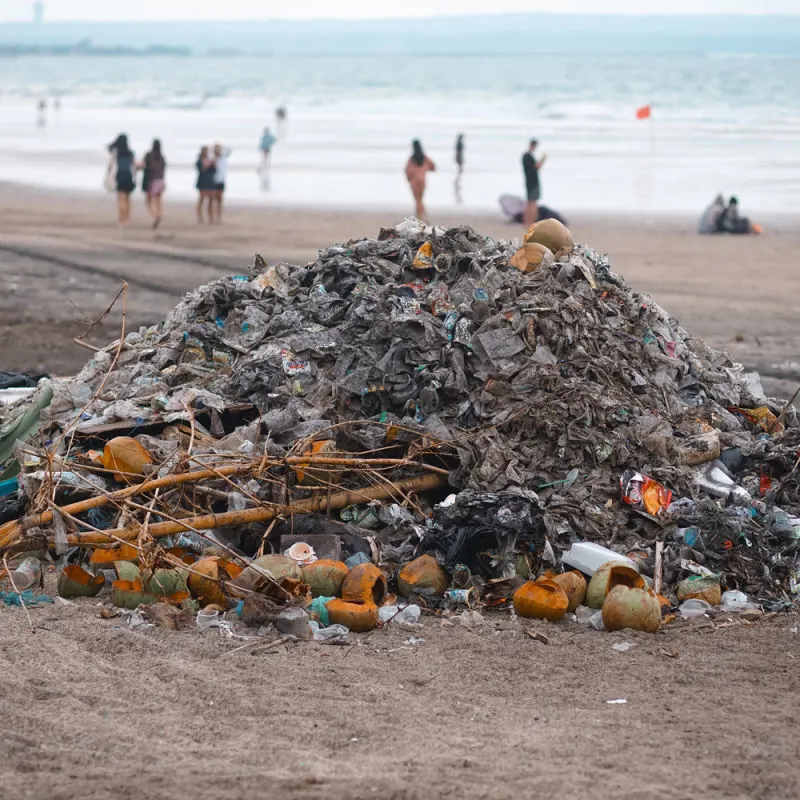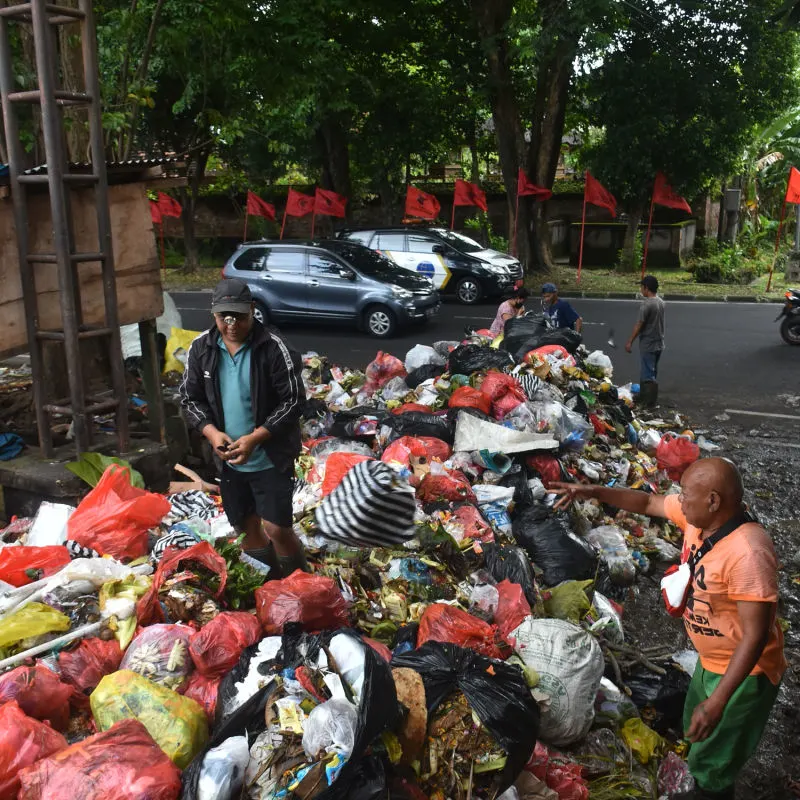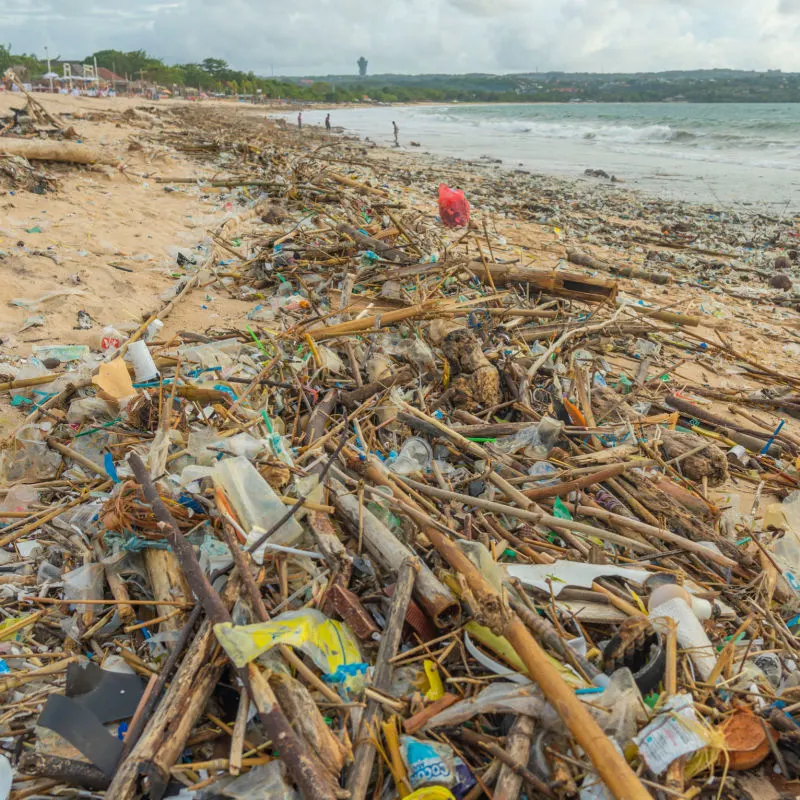On 14 February 2024, Bali will introduce a new tourism tax that will require all international visitors to the island to pay IDR 150,000 on arrival.
At the time of the announcement of the new tax, officials said that the revenue generated would be spent on preserving Balinese culture and the natural landscape. It has now been confirmed that up to 70% of funds generated will be spent on waste management.

As landfill sites around Bali continue to burn, the Acting Governor of Bali, Sang Made Mahendra Jaya, has held a meeting to discuss how waste will be handled in the coming days as firefighters continue to battle the blaze.
Acting Governor Jaya met with leaders from Denpasar, Badung, Gianyar, and Tabanan on Sunday afternoon.
Jaya wants these fires to be a turning point for waste management on the island.
He told the meeting attendees, “It would be good if existing villages learned about waste management from villages that have been successful. Ask them to study there. Yes, at the moment they must observe, imitate and modify so that waste handling is truly optimal.”
He went on to say that Bali must see a paradigm shift so that children are taught about waste management throughout their schooling years.
Acting Governor Jana wants to see schools and businesses independently manage waste and see greater investment in recycling facilities.
The Acting Governor confirmed that when the tourism tax comes into effect, the majority of the funds generated will be used to tackle Bali’s mountain waste management issue.
Some leaders had called for funding to be allocated to improving transportation infrastructure and cultural conservation. But Acting Governor Jaya wants to see waste management tackled upfront.
He told the room, “50-70% will be for waste handling. The hope is that in 2024 the waste problem will be resolved because funds are available.”
By the end of 2023, Bali will have welcomed over 4.5 million international visitors. If this same figure is assumed for 2024, then the government can bank on upwards of USD 45 million in tax revenue to dedicate to the cause.
This, incidentally, is the same amount of money plastic pollution NGO Sungai Watch has said they would need to create a radical change in the island’s waste processing system.
Speaking earlier this year, founder of Sungai Watch Gary Bencheghib said that he and his teams would need USD 40 million to establish enough localized waste processing facilities that would make landfill sites across the island a thing of the past.
There are dozens of local NGOs working tirelessly to raise awareness and create tangible solutions to Bali’s waste management disasters.
Organizations like Bye Bye Plastic Bags, Youthtopia World, Mudfish No Plastic, 4Ocean, Plastic Angels Bali, and many others are all working to implement solutions.
As fires continue to burn at Bali’s biggest landfill sites, concerns are now growing about where waste generated since the fires began last week will be dumped.
Some of the landfill sites have stopped taking new waste completely, and others are only taking a small amount of the hundreds of tonnes they usually accept every day.
When the landfill sites have been closed in the past, rubbish has been dumped nearby, blocking up roads and villages and creating a safety hazard for the public.

With funds from the tourism tax not going to be available until 2024, the provincial government must find a way to fund more solutions in the meantime.
One thing is for sure: there are many regular visitors to Bali who have been enjoying annual vacations to the island for years who feel conflicted about paying an additional tourism levy to fix something they feel the government should be wholly responsible for.

Many tourists have expressed that they don’t mind paying an additional IDR 150,000 per person tax to support the health and prosperity of the island.
However, many have expressed feelings of frustration that the cost of visiting Bali is rising, especially since the free visa on arrival has been scrapped in favor of the paid-for visa on arrival for tourists from 92 countries.
Remove All Ads & Unlock All Articles… Sign up for The Bali Sun Premium

Plan Your Bali Holiday:
Book The Best English Speaking Drivers For Airport Transfers & Tours
Choose From Thousands of Bali Hotels, Resorts, and Hostels with Free Cancellation On Most Properties
Book Cheap Flights To Bali
Don’t Forget Travel Insurance That Covers Medical Expenses In Bali
For the latest Bali News & Debate Join our Facebook Community
SUBSCRIBE TO NEW POSTS
Enter your email address to subscribe to The Bali Sun’s latest breaking news, straight to your inbox.
Discover more from The Bali Sun
Subscribe to get the latest posts sent to your email.

Thommo
Sunday 22nd of October 2023
Radical change is needed in Trash management and radical change is needed in the brains of the locals who throw and burn their rubbish wherever they like. This has been an issue for decades and locals still don't care where and when they throw or burn it.
rika
Friday 20th of October 2023
Be nice if sungai watch got the 40 million... something might actually happen...
But the money will disappear
And the rubbish will not!
Arthur
Tuesday 17th of October 2023
this can't be true, this is a cinema...
Exp
Tuesday 17th of October 2023
17/10: IQAir.com: The air quality around Kerobokan, Canggu is on level with Jakarta today. But worse, the smoke is probably very unhealthy. This is really shameful.
Bali want tourists to be taxed to sort out trash management issue? These tourists are staying at villas/hotels that are actually paying Banjars/Desa for trash collection, hence included in the room rate. This is really shameful. Why not increase trash collection fees so the many (well off) locals also can feel the pain of years of mismanagement? But no; tourists shall pay for basic infrastructure. Next we can expect: Tourist taxes allocated for new roads, electricity production, fresh water supply, sewage treatment, building schools, hiring more civil servants?
Egbert
Wednesday 18th of October 2023
@Exp,
Pathetic.
Mr Bear Snr
Tuesday 17th of October 2023
Given that the rubbish on the beaches didn't subside as a result of no out of country tourists during covid then its Indonesians who are responsible for the majority of it.
Exp
Wednesday 18th of October 2023
@Mr Bear Snr, Trash is dumped by the locals into the river ravines and later flushed down the rivers and into the ocean during rainy season. Wind bring the trash onto the beaches.
In the lowland the locals also dump their trash into man made drains (I have seen this done first hand) and when flooded these drains bring the trash down to the ocean as well.